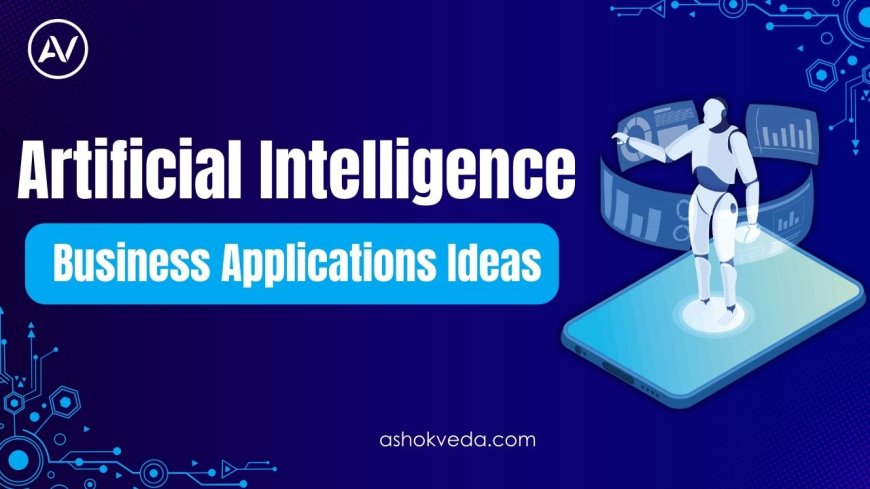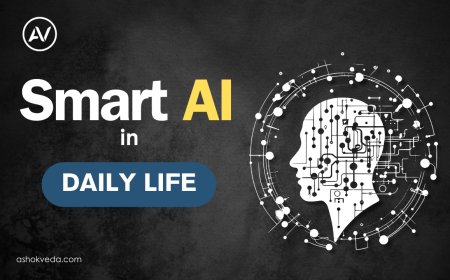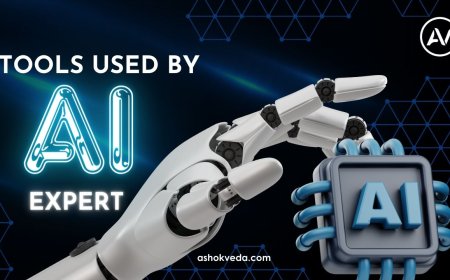Artificial Intelligence Business Applications Ideas
Explore practical ideas for implementing artificial intelligence in business to enhance efficiency, decision-making, and customer experience.

If you're here, you're interested in how Artificial Intelligence (AI) could change the corporate sector Nowadays, we'll look at some amazing Artificial Intelligence Business Applications Ideas that can change how companies run. AI is no longer simply a term. It's a strong weapon transforming industries left and right Whether you run a small startup or manage a major corporation, AI has limitless potential to improve business operations, improve customer experiences, and accelerate growth.
What is Artificial Intelligence?
Artificial Intelligence (AI) is a control of computer science that focuses on developing systems capable of running tasks that would normally need human intelligence. This includes based on data learning, pattern recognition, decision-making, and even human language understanding.
The Power of Artificial Intelligence in Business
Artificial intelligence (AI) refers to robots or software that can replicate human intellect by learning from data and making judgments and predictions. Machine learning a subset of artificial intelligence, is the process of training algorithms to recognize patterns in data and improve over time
Businesses are using AI in a variety of ways, from automating routine tasks to pulling insights from massive volumes of data. Here are a few popular AI-powered business applications:
Customer Service and Support
-
Chatbots and Virtual Assistants: AI-powered chatbots can handle customer inquiries 24/7, providing instant responses and freeing up human agents for more complex issues.
-
Personalized Recommendations: Machine learning algorithms analyze customer behavior to offer personalized product or service recommendations, enhancing the customer experience.
Marketing and Sales
-
Predictive Analytics: AI can analyze historical sales data to forecast future trends, helping businesses make informed decisions about inventory and marketing strategies.
-
Targeted Advertising: AI can segment audiences and deliver targeted ads based on user behavior, improving the efficiency of marketing campaigns.
Operations and Supply Chain Management
-
Inventory Management: AI systems can predict demand and optimize inventory levels, reducing waste and ensuring products are available when needed.
-
Logistics and Delivery: AI can optimize delivery routes, reducing costs and improving delivery times.
Exploring Artificial Intelligence Business Applications Ideas
1. AI-Powered Market Research
Understanding your market is important to business success. Traditional market research methods can be time-consuming and expensive. AI can make this process easier by evaluating massive datasets rapidly and accurately. For example, AI may monitor social media platforms, forums, and online reviews to determine public opinion about your products or services. This real-time knowledge enables you to adjust your plans quickly.
2. Intelligent Customer Insights
Learning more about your clients is essential for providing them with unique experiences. AI can analyze client data to identify patterns and preferences. For example, an AI system can develop extensive client profiles by analyzing purchase histories, browsing habits, and social media activity. These profiles allow firms to personalize their marketing campaigns and increase consumer retention rates.
3. Enhanced Fraud Detection
Fraud can be a major concern for many firms, particularly those in finance and e-commerce. Artificial intelligence may help in the identification of criminal operations by studying transaction trends and finding anomalies. Machine learning algorithms may learn from past fraud incidents and increase their accuracy over time, giving firms a strong defense against fraud.
4. Streamlined recruitment processes
Hiring the right employees is essential for any organization. AI can transform recruitment by automating the initial screening of resumes. Natural language processing (NLP) algorithms may examine resumes and match candidates to job descriptions, decreasing HR teams' burden and ensuring that only the most qualified individuals are considered.
6. Predictive Maintenance for Manufacturing
Downtime in manufacturing can be costly. AI can forecast when machines may break by studying sensor data and prior maintenance records. This predictive maintenance technique allows firms to schedule maintenance actions in advance, decreasing downtime and saving money.
7. Optimized pricing strategies
Pricing is a vital component of corporate success. AI can analyze market conditions, competitive prices, and customer demand to offer the best pricing methods. Dynamic pricing algorithms allow firms to modify prices in real-time based on supply and demand, maximizing income.
8. Smarter Inventory Management
Inventory management is important for organizations in retail and e-commerce. AI can estimate demand and optimize inventory levels, assuring that things are available when customers need them. This lowers the likelihood of overstocking or stockouts while increasing overall efficiency.
Implementing AI in Your Business
-
Identify the Right Use Cases: Start by identifying the areas of your business where AI can have the most impact. This could be anything from customer service to supply chain management.
-
Choose the Right AI Tools: There are many AI tools and platforms available, each with its strengths and weaknesses. Choose tools that align with your business needs and have a proven track record of success.
-
Invest in Data: AI relies on data to make accurate predictions and decisions. Ensure that you have access to high-quality data and invest in data collection and management systems if necessary.
-
Start Small: Begin with small AI projects that can be scaled up over time. This allows you to test the waters and see the benefits of AI without committing resources upfront.
-
Monitor and Optimize: AI systems need to be monitored and optimized continually. Regularly review the performance of your AI applications and make adjustments as needed to ensure they continue to deliver value.
Overcoming Challenges
Data Privacy and Security: Confirm that your AI systems follow data privacy rules and have strong security mechanisms in place to safeguard sensitive information.
Skill gaps: The implementation of AI may necessitate the acquisition of new skills and knowledge. Consider investing in training for your current employees or employing AI experts to cover any gaps.
Change Management: Implementing AI might cause changes in workflows and job responsibilities. Communicate honestly with your staff about the benefits of AI and offer assistance in transitioning to new methods of working.
AI is changing the business environment by providing creative solutions to increase productivity, improve consumer experiences, and fuel growth. Explore these Artificial Intelligence Business Applications Ideas to remain ahead of the competition. Remember that the secret to successful AI implementation is to start small, use the correct tools, and keep optimizing your systems. Accept the power of AI and see your business grow in the digital future!





































